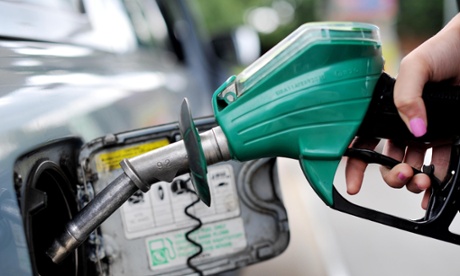
UK inflation fell to the lowest level on record in January as the sharp drop in global oil prices fed through to petrol pumps and food prices continued to fall amid a supermarket price war.
The government’s preferred measure of inflation fell to 0.3% in January from 0.5% in December, the slowest pace since equivalent records began for the consumer prices index in 1989.
The Office for National Statistics said the drop in inflation was driven by falling fuel and food prices. The chancellor, George Osborne, welcomed the news as a “milestone for the British economy” that will ease the pressure on household budgets as he sought to rebuff fears that the UK could be headed towards “damaging deflation”.
Economists in the eurozone and the UK have been watching for signs of a deflationary spiral where consumers and businesses put off spending in anticipation of lower prices. They were reassured by the news on Tuesday that core inflation, which excludes the more volatile prices such as food and energy, actually rose in January, edging up to 1.4% from 1.3% in December, partly on the back of smaller clothes discounts compared with a year ago.
For now there was little reason to fear the UK was prone to the deflationary threat stalking the eurozone, where consumer and business spending was lacklustre and so less likely to fend off a downward spiral in prices, experts said.
John Hawksworth, chief economist at PwC commented:
There is certainly no sign of the systemic deflation that took a grip on Japan in the 1990s and the eurozone more recently. In particular, domestic demand growth remains relatively buoyant in the UK, helped by the windfall gains to consumers from lower petrol and food prices. This has put real wages back on an upward track for the first time since the recession.
Rob Wood, chief UK economist at the German bank Berenberg, said there were many reasons a deflationary spiral was unlikely in the UK, including solid growth and falling unemployment. He added:
With every decline in inflation, the screams about ‘Japanification’ and deflationary spirals will probably get louder. But those worries are overblown. Developments in the UK just recently have very little, if anything, in common with Japan.
The UK has not seen low inflation because domestic wages are falling, or because the authorities have left problems in the banking system to fester. Rather the UK is seeing low inflation primarily because oil prices have tanked and sterling’s rise has made imports cheaper.”
Falling food and fuel prices take inflation lower in January
The ONS data did reinforce expectations that the UK will experience inflation falling into negative territory, albeit briefly, in coming months. The last time headline inflation was negative in Britain was in March 1960, according to the closest comparable data from the ONS.
“We think that a brief period of deflation is imminent,” said Paul Hollingsworth, UK economist at the thinktank Capital Economics.
Whilst only Eon’s cut to gas prices came into effect in January, the other utility companies’ price cuts should feed through between now and April. In addition, although we have probably seen the full impact of lower oil prices on petrol prices, we have almost certainly not seen the full effect trickle down to other goods. Accordingly, we still think that the UK will experience a brief period of deflation around March or April this year.
With little sign that low inflation is becoming entrenched, though, the UK’s period of deflation should be of the “good” sort.
The figures follow a warning from the Bank of England last week that Britain is sliding towards its first bout of negative inflation in more than half a century. But the Bank governor, Mark Carney said strong economic growth should stave off the threat of a deflationary spiral.
Carney and his fellow policymakers have a government-set target of inflation at 2%. The governor has said that if low inflation persists for longer than expected and the global economy is weaker, the Bank stands ready to cut interest rates further from the current record low of 0.5% and to pump more money into the economy through quantitative easing. But policymakers have repeatedly said they expect the next move in interest rates will be up.
Business lobby group the British Chambers of Commerce said the latest figures showed the Bank must not hurry into raising rates.
Its chief economist, David Kern, said:
With inflation set to remain low, these figures further strengthen the case for the MPC to keep interest rates on hold until at least 2016.”
With the cost of living a key battleground in the run-up to May’s election, Osborne seized on the impact of lower inflation on families’ finances. He said:
Today we see lowest CPI inflation ever – a milestone for the British economy. It is great news for families whose budgets will stretch even further ...
Although the low inflation is, as the Bank of England confirmed last week, driven by lower food and energy prices rather than damaging deflation, we will remain vigilant to all risks, particularly when the global economic situation is so uncertain.”
Labour emphasised that many households were still feeling the effects of years of wages falling in real terms as pay rises failed to match or beat inflation.
The shadow treasury minister, Cathy Jamieson, said:
Inflation is falling around the world because global oil prices have plummeted. But in Britain wages continue to be sluggish and working people are £1,600 a year worse off under this government.”
The FTSE 100 closed at its highest level for more than 15 years, as the prospect of a rise in interest rates receded following the inflation data. The leading index finished 41.08 points higher at 6898.13, its highest point since the record close of 6930 on 30 December 1999, the peak of the dotcom boom.

